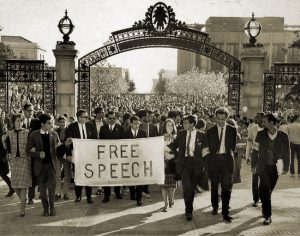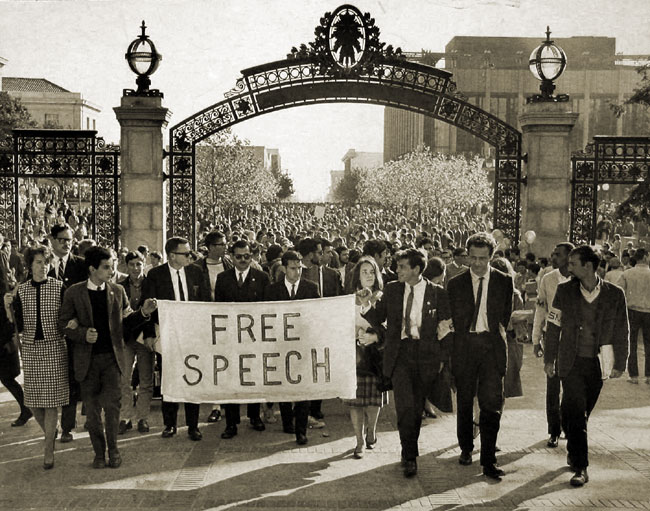The raw courage of an open conservative at UC Berkeley
Meeting representatives of Berkeley’s College Republicans in the Trump era, you learn that courage is not limited to men in uniform on foreign battlefields.
 In 1964, the Free Speech Movement came to the University of California, Berkeley. It began as a protest against Berkeley’s extremely strict rules regarding political speech. Wikipedia has a good rundown of those rules:
In 1964, the Free Speech Movement came to the University of California, Berkeley. It began as a protest against Berkeley’s extremely strict rules regarding political speech. Wikipedia has a good rundown of those rules:
In 1958, activist students organized SLATE, a campus political party meaning a “slate” of candidates running on the same level – a same “slate.” The students created SLATE to promote the right of student groups to support off-campus issues. In the fall of 1964, student activists, some of whom had traveled with the Freedom Riders and worked to register African American voters in Mississippi in the Freedom Summer project, set up information tables on campus and were soliciting donations for causes connected to the Civil Rights Movement. According to existing rules at the time, fundraising for political parties was limited exclusively to the Democratic and Republican school clubs. There was also a mandatory “loyalty oath” required of faculty, which had led to dismissals and ongoing controversy over academic freedom. Sol Stern, a former radical who took part in the Free Speech Movement, stated in a 2014 City Journal article that the group viewed the United States to be both racist and imperialistic and that the main intent after lifting Berkeley’s loyalty oath was to build on the legacy of C Wright Mills and weaken the Cold War consensus by promoting the ideas of the Cuban Revolution.
On September 14, 1964, Dean Katherine Towle announced that existing University regulations prohibiting advocacy of political causes or candidates, outside political speakers, recruitment of members, and fundraising by student organizations at the intersection of Bancroft and Telegraph Avenues would be “strictly enforced.”[13] (This strip was until then thought to be city property, not campus property.) (Hyperlinks omitted.)
By October 1964, the matter came to a head when police arrested a former student for setting up a political table on campus and students began a mass protest. Again, from Wikipedia:
On October 1, 1964, former graduate student Jack Weinberg was sitting at the CORE table. He refused to show his identification to the campus police and was arrested. There was a spontaneous movement of students to surround the police car in which he was to be transported. The police car remained there for 32 hours, all while Weinberg was inside it. At one point, there may have been 3,000 students around the car. The car was used as a speaker’s podium and a continuous public discussion was held which continued until the charges against Weinberg were dropped.
On December 2, between 1,500 and 4,000 students went into Sproul Hall as a last resort in order to re-open negotiations with the administration on the subject of restrictions on political speech and action on campus. Among other grievances was the fact that four of their leaders were being singled out for punishment. The demonstration was orderly; students studied, watched movies, and sang folk songs. Joan Baez was there to lead in the singing, as well as lend moral support. “Freedom classes” were held by teaching assistants on one floor, and a special Channukah service took place in the main lobby.
As it did often during the 1960s (and continues to do today), the campus administration backed down before the students’ wrath. What made the free speech movement different from all the other student demands over the decades since then is that, in 1965, the students had a valid point: Academic institutions, especially those that accept government money, cannot shut out the First Amendment.
Sadly, this righteous movement quickly became a Leftist cause — which is ironic, really, given how deeply opposed the Left is to free speech. The Leftists channeled that student energy into anti-war demonstrations and the usual Marxist pap. It also took the genuine civil rights concerns about the way blacks were treated in the United States and morphed it into all of the ills bedeviling race relations today, including support for militant black nationalist movements such as the Black Panthers (which reappeared in 2015 as the Black Lives Matter movement). (For more on the way the Left manipulated well-intentioned and true Civil Rights activism, especially in and around Berkeley, I recommend David Horowitz’s Radical Son: A Journey Through Our Times from Left to Right.)
Still, despite its sad Marxist decline, Berkeley continued for decades — indeed, right up until 2017 — to be associated with free speech. When I was a student there in the late 1970s and early 1980s, the campus definitely tilted Left (as evidenced by students celebrating the attempted assassination on Reagan in 1981), but you could still voice ideas inconsistent with McGovernite Democratic principles.
My, how Berkeley has changed.
America got a chance to see Berkeley’s decline with the riots attendant on Milo Yiannopoulos’s and Ben Shapiro’s attempts to speak on campus. In both cases, student protesters, who came prepared to yell, show off stupid signs, and make a ruckus, were joined by “Antifa,” a group that uses hardcore fascist practices — black-clad, masked figures in jackboots carrying clubs and rocks, and using extreme violence to silence those with whom they disagree — all for the ostensible purpose of being “anti-fascist.” Antifa members brutally attacked people, set Berkeley’s Student Union building on fire, and generally ran bloody riot. Hitler’s Brown Shirts or Mussolini’s Black Shirts couldn’t have done better. Meanwhile, campus and Berkeley police couldn’t have done worse because they did . . . nothing.
At the center of all this violence stood a small band of 10 or so Berkeley College Republicans. They were the ones who had invited these speakers, they were the ones who dealt with the administration’s increasingly extreme demands for money, for venue changes, for curfews, etc., and they were the ones who faced off against Antifa thugs.
Yesterday, I had the pleasure of meeting two of those Berkeley College Republicans, Naweed Tahmas and Paulo Napolitano. Contrary to the Left’s favorite stereotype about Republicans, neither of these young men is your typical WASP American. Tahmas is an American of Iranian descent; Napolitano is a Brazilian who came here as a boy.
Both Tahmas and Napolitano were thoughtful, articulate, respectful, courageous, and boasted good senses of humor. It was impossible to imagine either of them swearing at politicians, insulting half of America, demeaning their own parents, or narcissistically insisting that Americans boycott a show’s advertisers because the show’s host pointed out that they were not the only ones who failed to get into prestigious colleges and should therefore stop “whining.”
These young men were . . . oh, God!, I’m going to use a really old-fashioned word and idea here . . . gentlemen. How’s that for a bizarre concept?
Tahmas gave a short talk about the treatment meted out to him and his fellow campus Republicans. He’s been doxxed (meaning that people opposed to him made public his address so that he can be hunted down), punched, threatened with death, run over with bicycles, spat upon, had rocks thrown through his window, and is constantly being followed around and photographed in a very non-admiring way. I was going to make a little joke there, along the lines, of “and that’s just the administration,” but I want to stick to the facts. About 70% of his assailants and harassers, he thinks, are students.
The university administrators are not violent, but they are just as obstructive. When the college Republicans invite speakers to campus, the university imposes huge fees for hosting, something not demanded for any other campus speakers; insists that the talks must be given before 3 p.m., meaning that students cannot attend because of classes; refuses on-campus venues, requiring instead that speakers appear at sites far off campus; and limits the audience to students, with no alumni or members of the public allowed. All of these, of course, are impermissible preconditions on speech, entirely out of sync with the precedent from the Free Speech Movement.
As an aside, the hosting fees are ostensibly intended for security. The riots for the Yiannopoulos and Shapiro talks shows that this is a lie. Indeed, Tahmas said that, when the slavering mob surrounded the Student Union building and set a fire to smoke everyone out, the police refused to provide an escort for the College Republicans. Tahmas escaped uninjured only because he ran faster than the mob chasing him.
In addition, the administration has taken to using intimidation to try to silence conservative speakers on American campuses. When the College Republicans invited Ann Coulter, Tahmas was called into a discussion with the administrators. He was told that he would be meeting with just one or two people, so he should come alone. When he entered the room, he found himself facing 15 members of the college administration. (It’s a fair fight, when you think about it: one intelligent young Republican versus 15 campus Leftists.) Throughout the meeting, they demeaned him, insulted the speakers, and were so obstructive that the College Republicans eventually had to cancel Coulter’s appearance.
To add insult to injury, just the other day, the Student Union announced that, for the first time in the history of the Berkeley College Republicans (a branch of a national group going back to the 1890s), it was refusing to give it any funds — never mind that the group’s members have a percentage of their tuition fees routed to the Student Union for the express purpose of funding student groups.
All is not lost, though. Tahmas said that the college Republicans are the biggest political organization at Cal, with around 60 members (and that more students are pouring in). These new members are people who don’t admire the rampant campus Leftism or the Antifa violence or the administration’s conspiracy to deprive students of their First Amendment rights. On a very small scale, they’re playing out what’s happening with the NRA at a national level: As the Left gets more hysterical and open about its demand that the America repeal the Second Amendment, the NRA is picking up money and members. Even the Millennial generation apparently has its limits.
Here’s another good thing: After the campus imposed unconstitutional speech restrictions on the invitation to Ann Coulter, the College Republicans joined with Young America’s Foundation and reached out to Harmeet Dillon to sue the university for violating their civil rights. U.S. Attorney Jeff Sessions (finally) put the DOJ’s weight behind the effort.
During the question session after his talk, Tahmas addressed the courage that sees a slightly built young man stand up, not just to the threat of violence, but to actual violence. He said (and I’m paraphrasing), that he went to Berkeley expecting to be exposed to different ideas, but also anticipating lively intellectual debate. Although he joined the college Republicans, Tahmas’s first instinct was to keep his head down. However, he says, the first time he got punched, he’d had it. He was not going to run from the fight. He was going to take the fight to the Left. Paolo agreed. These young men had experienced their “I’m mad as hell and I’m not going to take this anymore” moment and acted accordingly.
As you’ve probably gathered by now, I was quite awed and impressed by Tahmas and Napolitano. They are truly the promise of the future. Stop watching the David Hoggs of this world — immature, uninformed, emotional hysterics, all of them — and keep your eyes on the small group of young conservatives who are tired of hiding in the shadows.
I’ll close with two things. The first is the Berkeley College Republicans’ statement about who they are and what they stand for:
The Berkeley College Republicans are a group of young conservative political activists that are interested in politics, philosophy, debate, and discussion. We are composed of students that come from across the United States and around the world, and we are united in our shared belief of limited government and more personal freedom.
We are situated in the most liberal area of the United States: Berkeley, California. Known as the Birthplace of the Free Speech Movement, UC Berkeley is the epicenter for the fight for the First Amendment on college campuses. On February 1, 2017, violent riots transpired when our club attempted to host well known commentator Milo Yiannopoulos. In response to that, we started the New Free Speech Movement at UC Berkeley.
Since then, speaking events with David Horowitz and Ann Coulter have also been cancelled, leading us to file a lawsuit againts the University of California, Berkeley, for their violations of our First Amendment rights. Recently, the United States DOJ filed a Statement of Interest in support of our lawsuit.
We will not relent. We will continue to fight biased policies imposed on us by University administrators in an attempt to silence our speech. This is why we have declared 2018 as our Year of Freedom; we are hosting a wide range of conservative speakers that promote the conservative agenda in an effort to bring intellectual discourse back to the Birthplace of the Free Speech Movement.
Second, a video made in 1940, in a time of over-whelming fascism, that usefully, and musically reminds, reminds us that ten people doing the right thing, can be a powerful force:
*****


